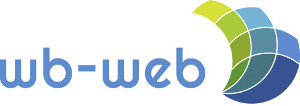DIE Research and Consultancy in relation to Corona
An overview of current and planned analyses, interviews and further formats
To what extent does the DIE take up the topic of corona in its scientific work? Which contexts are being researched? By analyzing and observing processes, we aim to support practice and policy in addressing the crisis. At this point, we provide an overview of published and planned journal articles, blog posts, issue briefs, analyses, and other formats.
PUBLICATIONS AND (BLOG) CONTRIBUTIONS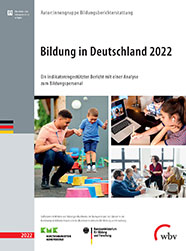
The national education report „Bildung in Deutschland 2022“
On June 23, 2022, the national education report "Education in Germany 2022" was published. Every two years, it provides information on developments in all areas of education - from early childhood education to continuing education.
This year's focus chapter is dedicated to education personnel and their structure, development, quality and professionalization - and for the first time provides a basis for discussion for an overarching comparison of those working in education throughout the entire education system. Furthermore, the report provides findings on the development of the education system in the Corona pandemic.
Volkshochschul Statistics 2020 show diverse impact of corona pandemic on VHS
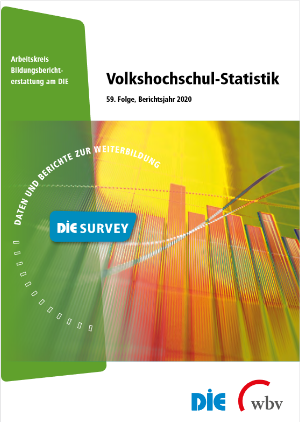 How are community colleges responding to the increasing need to digitize learning opportunities during the pandemic? Adult Education Statistics 2020 finds that the reported percentage of courses offering digital learning increased by 6.9 percentage points from 1.8% to 8.7% compared to the 2019 reporting year; the percentage more than quadrupled. In the Corona supplemental survey conducted in parallel with the main survey, the lack of digital literacy among faculty staff was perceived as the greatest of the queried problems for implementing an online course offering. The fact that course content was (at least partially) unsuitable for digital learning or that teachers lacked the necessary technical equipment was also considered to be a major limitation.
How are community colleges responding to the increasing need to digitize learning opportunities during the pandemic? Adult Education Statistics 2020 finds that the reported percentage of courses offering digital learning increased by 6.9 percentage points from 1.8% to 8.7% compared to the 2019 reporting year; the percentage more than quadrupled. In the Corona supplemental survey conducted in parallel with the main survey, the lack of digital literacy among faculty staff was perceived as the greatest of the queried problems for implementing an online course offering. The fact that course content was (at least partially) unsuitable for digital learning or that teachers lacked the necessary technical equipment was also considered to be a major limitation.
Further results of the VHS statistics can be found from page 128 here >
Adult and continuing education under pandemic conditions. Challenges and Perspectives
Issue 3/2021 of the Journal "Zeitschrift für Weiterbildungsforschung"
is devoted to the impact of the Corona pandemic on adult and continuing education: Adult education in its social, cultural, and professional contexts has changed with the pandemic. The impact can be seen in social conditions, organizational requirements and formats, and forms of learning. The spectrum of topics and content has also shifted, reflecting knowledge and skill requirements triggered indirectly or directly by the pandemic.
In society, the consequences of the Corona pandemic for early childhood and school education are the subject of intense debate. Early trends can be identified and preliminary findings are available on some aspects of these issues. Some of the studies collected in this issue to capture the extremely diversified continuing education sector tie in with well-known, established studies and point to changes. Their data base refers to the early phase of the pandemic in the spring and summer of 2020.
DIE Trend Analysis 2021: scientifically based foundations for decisions in education policy and practice
Which current trends are relevant for continuing education? Who offers continuing education and who even participates in it? What about the professionalization of staff in continuing education? And what are the consequences of the Corona pandemic for continuing education? The "DIE-Trendanalyse 2021" bundles the often scattered and difficult to access knowledge about continuing education in Germany, thus presenting the status quo of adult and continuing education in Germany and at the same time presenting a basis for decisions in educational policy and practice.
The complete DIE Trend Analysis 2021 can be found here >
Es hat dramatische Einschnitte gegeben.
Magazine of the Leibniz Association from 30.03.2021 with Josef Schrader
Weiterbildungsbranche von Corona schwer getroffen
Deutschlandfunk, Campus & Karriere from 22.01.2021 with Peter Brandt
Trotz Trend zu Remote Work: Die erstaunliche Krise der Weiterbildung
WirtschaftsWoche Online 1/2021 with Johannes Christ
So geht digitale Weiterbildung
Zeit Online 1/2021 with Jan Koschorreck
After the first Germany-wide lockdown in spring 2020, which included the closure of all cultural institutions, museums and other public institutions were allowed to gradually reopen in Germany in May 2020 under specific safety and hygiene measures to protect against infection. Together with the eight research museums of the Leibniz Association, Dr. Inga Specht from the DIE department "Teaching and Learning" investigated in the article "Die Wiedereröffnung der Museen aus der Perspektive der (potenziellen) Besucherinnen und Besucher" how the resumption of museum operations and a visit to a museum in the first phase of the Corona pandemic are perceived by visitors.
In their article „Education, health behavior, and working conditions during the pandemic: Evidence from a German sample”, Dr. Kerstin Hoenig (DIE) and Dr. Sebastian Wenz (Gesis) examine the relationship between education and risk of infection. The risk of becoming infected with corona is influenced on the one hand by individual health behavior and on the other hand by structural conditions, especially working conditions. The article is available in open access.
On 25.07.2020, the Deutschlandfunk program "Campus & Karriere" highlighted how the time during Corona can be used for one's own further education under the topic "Lifelong learning in times of crisis". For the DIE, Dr. Sarah Widany contributed to the discussion and disclosed the results of the National Education Report. Listen to the interview on deutschlandfunk.de (Dr. Sarah Widany speaks from minute 18:15).
Fleige, M., Gieseke, W. & Robak, S. (2020). Wir brauchen ein breites Bündnis für die Kulturelle Erwachsenenbildung. Blog post at J. M. Wiarda at jmwiarda.de [02.07.2020].
The EPALE blog post „Adult educators and researchers under quarantine“ by Dr. Alexandra Ioannidou addresses the restrictions experienced by researchers and educators in continuing education during the global lockdown.
wb-web blog posts offer further perspectives and/or bundle different, already existing posts on wb-web to present them to the target group, e.g. „Digital - Wenn nicht jetzt, wann dann?“, „Schwung in den Unterricht bringen“ or „Interaktion online - Wie kann's gelingen?“.
EVENTS AND STUDIES
DIE Forum Weiterbildung 2020 & dialog digitalisierung#04
Digital adult education - is it professional and of high quality?
On December 1, 2020, the "DIE-Forum Weiterbildung" & dialog digitalisierung #04 took place as a free online event. The 2020 topic: "Digital adult education - quality and professionalism".
As part of the forum, we awarded this year's "Prize for Innovation in Adult Education" to three outstanding projects that show how to make teachers in adult and continuing education digitally fit.
Documentation of the event with videos and presentations at www.die-forum.de
Online study on media use during Corona

An online study by Julia Granderath, Andreas Martin, Martin Merkt and Christina Sondermann (researchers from two DIE junior research groups) investigated the relationships between the perceived threat of the corona virus, media use, and perceived and actual informedness about COVID-19. Among other findings, results showed that individuals who felt more threatened by COVID-19 used media more frequently to become informed. In addition, frequent media use was associated with higher perceived knowledge about COVID-19, but not with higher actual knowledge.
Survey on the impact of the Corona pandemic on adult education centers
Corona supplementary survey to the DIE provider statistics - DIECovidSurvey
The DIE and the Deutsche Volkshochschul-Verband conducted a survey of German adult education centers on the impact of the pandemic in fall 2020. The pandemic has qualitatively and quantitatively changed the range of events offered by adult education centers. While the total number of events decreased in the first lockdown starting in March 2020, the Volkshochschulen were able to significantly expand their digital offerings. The shift to digital events also led to a shift in program structure in terms of event formats and content.
Further results of the survey can be found in the journal weiter bilden 2022(2): Abbrüche, Anschlüsse, Aufbrüche im Artikel "Aufbruch zu mehr Digitalität?".
wbmonitor 2020: Corona - Impact on continuing education providers
Between June 30 and August 9, 2020, the wbmonitor 2020 survey was conducted on the topic "Corona - Impact on Continuing Education Providers." In cooperation with the Federal Institute for Vocational Education and Training, the DIE collected extensive information on the realization of the continuing education and training offer during the first nationwide lockdown last spring and the subsequent opening phase in the summer as well as on the changes with regard to the organization of work and the personnel situation at the providers. In addition, information is available on government aid applied for and approved, as well as assessments of the current and expected future economic situation.
The complete report on the results of the survey can be downloaded here.
General information on the wbmonitor survey and the results of past surveys can be found at wbmonitor.bibb.de.
Project web page wbmonitor at die-bonn.de
wb-web tools and resources
wb-web continuously collects news that might be of importance for teachers in adult education. Especially the dossiers "Digitization" and "E-Learning" offer valuable recommendations for tools and resources that support teachers in their work in times of corona, including "Designing webinars correctly". Existing materials in dossiers are supplemented and updated.
In the EULE learning area, teachers can develop their actions in an application-oriented way. A learning path on teaching and learning with digital media provides tips for designing online lessons. All content is in German.
weiter bilden
weiter bilden. DIE Zeitschrift für Erwachsenenbildung
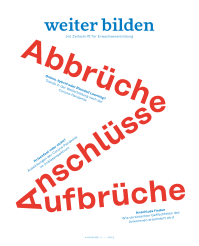 Issue 2/2022 „Abbrüche, Anschlüsse, Aufbrüche“ examines the impact on adult and continuing education after two years of the Corona pandemic and asks what the state of adult and continuing education is. What is missing that existed before the crisis? And is the change so disruptive that entirely new directions are being taken?
Issue 2/2022 „Abbrüche, Anschlüsse, Aufbrüche“ examines the impact on adult and continuing education after two years of the Corona pandemic and asks what the state of adult and continuing education is. What is missing that existed before the crisis? And is the change so disruptive that entirely new directions are being taken?
Read issue weiter bilden 2/2022
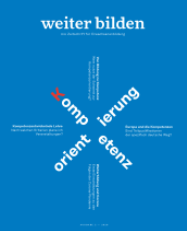 In Issue 2/2020 an interview with seven facility managers has been published, to whom the editorial team poses various questions about the current situation in order to get an initial assessment of the impact of the Corona situation. Among them, "How do you assess your current economic situation or that of your facility?" and "Are there certain positive developments that the crisis has caused or encouraged?"
In Issue 2/2020 an interview with seven facility managers has been published, to whom the editorial team poses various questions about the current situation in order to get an initial assessment of the impact of the Corona situation. Among them, "How do you assess your current economic situation or that of your facility?" and "Are there certain positive developments that the crisis has caused or encouraged?"
Read issue weiter bilden 2/2020
THE FOLLOWING PROJECTS AND ONLINE TOOLS OF THE THE SUPPORT THE WORK OF TEACHERS IN THE LONG TERM AND EXPLORE DIGITIZATION IN THE EDUCATION SECTOR
PAG 2: Product database literacy and basic education 2
The „PAG 2“ project is working on providing teachers in literacy and basic education with easier and faster access than before to free and quality-checked teaching materials. This foreseeably facilitates work in the home office and simplifies learning at home.
Project website at alphadekade.de
FAVILLE - Facilitators of virtual learning
In the FAVILLE project, research is being conducted into the professional competencies required by online teachers for the planning and implementation of digitalized courses. A training course on this topic will be piloted in five European countries and complemented by a suitable competence validation model. In addition, a method app will be developed and tested to support online teachers in the didactic planning of digitized teaching/learning units.

Meta project „Digitalisierung im Bildungsbereich“
(Digi-EBF)
Since the end of 2018, the BMBF has been supporting research into the effects of digitization processes and the requirements for their implementation through the "Digitization in Education" funding line of the „Rahmenprogramms Empirische Bildungsforschung“. As part of the accompanying Digi-EBF meta-project, the research findings are being processed for use in continuing education practice, among other things, and made available in various formats. In addition, several dossiers on various aspects of the digitization of adult and continuing education are being compiled to provide an overview of the respective state of research.
Project website at die-bonn.de
Project website digi-ebf.de
FuBi_DiKuBi
The FuBi_DiKuBi project explores how digitization is integrated into the VHS service structure, what educational needs exist in a digitized society, and how the VHS responds with its services in order to ensure participation in cultural educational opportunities for broad segments of the population in accordance with its public educational mandate.
Project website at die-bonn.de
KANSAS Search Engine
The KANSAS search engine www.kansas-suche.de is an online tool to support teachers in literacy and basic education as well as German as a second language. KANSAS is developed in an interdisciplinary project.
Course planning app DEMAL
„DEMAL“ is a free web-based course planning app in six languages. After free registration at www.course-planner-app.com, teachers can plan adult education courses online and are supported by the app in selecting appropriate teaching-learning methods.
Method pool for language-sensitive teaching
At www.unterrichtsmethoden-sprachsensibel.de, teachers can find an adaptive tool for planning language-sensitive lessons. The tool was further developed in cooperation with the Mercator Institute for German as a Second Language and Language Support in Cologne and currently contains more than 50 methods for designing language-sensitive lessons.
Promoting diagnostic competence with video cases
At www.videofallarbeit.de, interested teachers can train their own diagnostic competence online alone and in small groups.
Photo: Marco Rothbrust
Kurzlink zu dieser Seite:
die-bonn.de/li/1723


